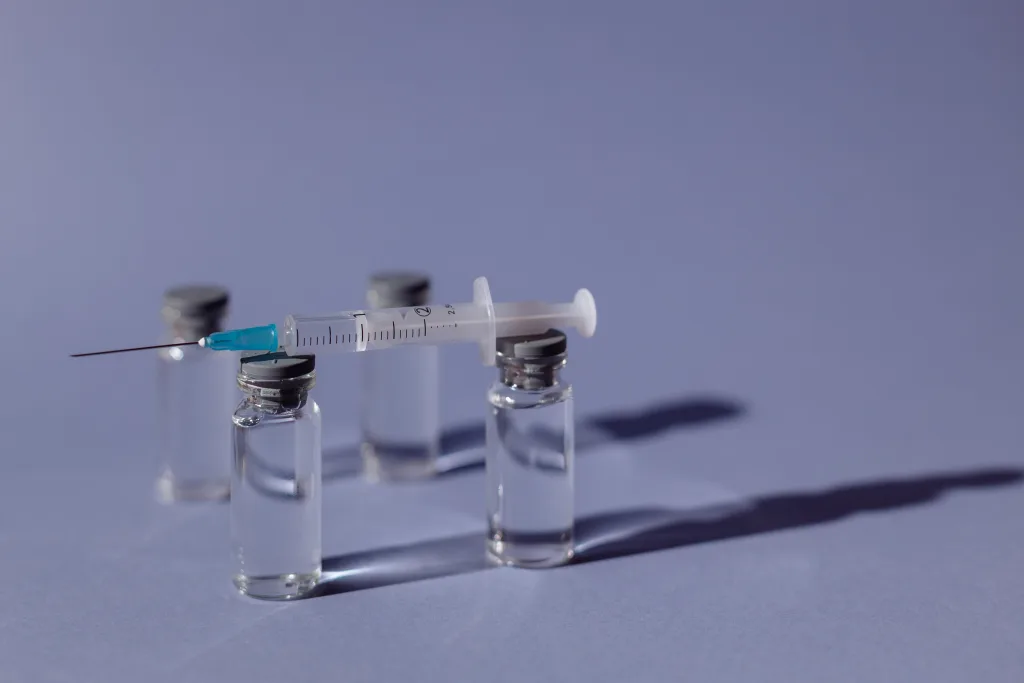Introduction
In today’s world obsessed with image and permeated by promises of quick fixes, Human Chorionic Gonadotropin (HCG) injections have exploded in popularity as a rapid method for dramatic weight loss. Their surge into diet and wellness spheres has been further fueled by celebrity endorsements and prolific exposure on social media outlets. However, as is often the case with trendy diet approaches that gain virality, rampant misinformation and myth continues to surround the use of HCG injections for weight loss purposes.
As someone considering or currently using HCG injections to lose weight, it is absolutely critical you understand the full reality behind this controversial technique before proceeding. Research must extend beyond the promises peddled by companies profiting from their sale. Safety requires an awareness of possible side effects beyond desired aesthetic outcomes. And sustainable success necessitates separating the facts from fiction propagated in the media.
The straightforward purpose of this blog post is to unveil the truth about HCG injections for weight loss, examining the legitimate evidence from multiple lenses to empower your decisions. We will closely analyze what HCG actually is, scrutinize theories regarding its use for weight loss, thoroughly debunk some common myths and misconceptions, transparency discuss potential health risks and ethical concerns, overview safer lifestyle-focused alternative approaches, and ultimately equip you to make fully informed choices about your personal health and wellness journey. Put simply, the goal is to provide enough insight that you feel wholly confident proceeding with eyes wide open. So let’s get started, step-by-step!

Understanding HCG and Theoretical Roles in Weight Loss
To establish context, HCG is a natural hormone occurring in the human body and absolutely vital for healthy pregnancy. Produced by the syncytiotrophoblast cells of the developing placenta following conception and implantation, HCG exponentially increases circulating blood levels during early pregnancy to peaks around 10-12 weeks gestation. HCG acts to rescue and maintain corpus luteal progesterone production, without which pregnancy risks early failure. By triggering certain ovarian changes and increasing progesterone synthesis, HCG literally sustains the pregnancy until the placenta develops adequately to secrete progesterone itself. After 12 weeks, HCG levels gradually decline to much lower concentrations for the remainder of a healthy pregnancy.
So in summary, HCG secreted by the placenta is utterly essential for progressing through the initial stages of pregnancy until the mother’s body transitions to sustain optimal progesterone levels itself that support carrying the fetus to full term delivery.
Outside the context of pregnancy, trace amounts of HCG can also be detected in females at levels typically less than 5mlU/ml on average. However this baseline circulating HCG outside pregnancy in healthy, non-pregnant women serves no known biological function. This becomes important later.
Shifting gears to explore using HCG injections specifically for non-pregnancy related weight loss, the original theory traces back to a 1954 paper published by the late British endocrinologist Dr. Albert T.W. Simeons. After observing subtle reductions in adipose fat tissue among undernourished pregnant women in India, Dr. Simeons began conducting clinical trials administering low-dose HCG injections paired with severely restricted 500-calorie daily diets on both obese and non-obese patients in salvage hopes of triggering similar fat metabolism effects.
In his manuscript “The Action of Human Chorionic Gonadotropin in the Obese”, Dr. Simeons proposed two mechanisms attempting to explain his observed results. First, he hypothesized HCG might directly liberate stored tissues and mobilize structural fat to be available for metabolism. Second, he speculated HCG might centrally influence the hypothalamic portion of the brain and somehow shift the body’s metabolism towards accessing and burning available fat reserves rather than structural fat or muscle.
However neither theory was rooted in rigorous scientific evidence. Nonetheless, his radical claims of discovering a “cure to obesity” spread like wildfire. His HCG diet protocol promising rapid, substantial weight loss results catalyzed enormous public interest and spawned a network of lucrative weight loss clinics. This popularity endures today through endless HCG diet variations, injection protocols and supplemental products created since Simeons’ era targeting those desperate for dramatic cosmetic weight loss.

Debunking Common Myths and Misconceptions Surrounding HCG Injections
Now that we have thoroughly covered the background science behind HCG as a hormone and explored the original theories proposing its use for weight loss, we pivot our focus towards scrutinizing information you may commonly encounter from sources prominently marketing HCG diet products protocols. As consumer demand intensifies for rapid solutions producing radical body transformations, monetary incentives likewise increase for companies to aggressively sell products promising exactly that regardless of efficacy or safety. Hence in the fierce battle for market share, factual nuance often gets sacrificed.
Therefore let’s diligently examine some of the biggest myths frequently perpetuated around using HCG injections for dieting purposes. For each common claim, we will reference credible scientific evidence revealing the accurate reality.
Myth 1: HCG Injections Directly Trigger Rapid Weight Loss
Among the boldest assertions made by HCG diet proponents is the proposition that HCG actively stimulates fat metabolism, directly producing accelerated weight loss beyond comparisons. However the vast body of double-blind randomized controlled research conducted on HCG for weight loss has definitively failed to show these effects manifest in reality.
For example, a 1995 study published in the International Journal of Obesity examined over 200 female participants assigned to receive either HCG injections plus 500 cal dieting or placebo saline injections plus 500 cal dieting. While both groups certainly lost weight given the exceptionally low caloric intake, the HCG group showed no enhanced weight loss or body fat composition improvements versus the placebo group. This result powerfully demonstrates weight loss occurred purely as a consequence of calorie deficit, with HCG providing no additional fat metabolizing or weight reduction benefits.
This conclusion has been further substantiated by numerous recent meta-analyses aggregating numerous high quality blinded HCG research. A systemic review published in the Journal of Obesity surveyed over 25 previous controlled HCG studies to compile comprehensive statistical evidence, conclusively stating:
“There is no scientific evidence that HCG is effective in the treatment of obesity; it does not bring about weight-loss or fat-redistribution, nor does it reduce hunger or induce a feeling of well-being.”
In summary, assertions that HCG injections intrinsically stimulate or accelerate weight loss have been robustly disproven. Extreme calorie deficits function as the definitive driver of initial weight changes.
Myth 2: HCG Allows Maintaining Extreme Calorie Deficits
A second common claim suggests that HCG administration provides protective metabolic effects that allow safely sustaining extreme 500 calorie per day deficits. The promised narrative is that HCG unlocks stored fat so less energy is required to avoid side effects of starvation dieting.
However this belief demonstrates a fundamental misunderstanding of human metabolism. No external supplement can supersede your body’s intrinsic drive for homeostasis when faced with prolonged substantial energy deficits. As the first priority of countless genetic and neuroendocrine feedback loops is preserving internal balance, perceived starvation inevitably triggers progressive metabolic adaptations.
Initially, weight loss occurs more easily due to glycogen depletion and water excretion. However the body quickly responds by reducing energy expenditure and slowing metabolism to defend caloric needs. Simultaneously, hunger-regulating neurotransmitters like ghrelin and leptin become disrupted. These adaptive responses make adhering to extreme deficits progressively more difficult over several weeks until weight plateaus or rapid rebounds when resuming normal intake.
In summary, no injections can override homeostasis defenses activated by extreme energy deficits. Weight loss inevitably stalls over time as the body brakes metabolic output. Vowing to continue such aggressive calorie restriction then sets the stage for repeat failure cycles.
Myth 3: HCG Protocol Sets Foundation for Sustainable Success
An additional common claim regarding HCG is that enduring the intensity of 500 calorie deficits while using HCG injections remodels metabolic behaviors so that future weight maintenance becomes effortless after finishing the protocol. Promoters assert that by resetting the body’s “weight thermostat” downwards with HCG-augmented calorie deprivation, your metabolism will not revert to prior setpoints once normal eating resumes.
Unfortunately, this thinking once again reveals ignorance of metabolic science. As explored regarding Myth 2, homeostasis systems quickly counteract acute energy deficits by reducing energy expenditure. Hence surviving phases of crash dieting depends on adaptations consciously fighting your body, rather than harmonizing with innate regulation. As mind cannot override metabolism forever, the majority of lost weight is typically regained.
The most recent and credible research on sustainable weight management clearly shows that lasting Results do not stem from short-term extreme regimens. Rather, safe and maintained weight reduction is achieved through consistent lifestyle adjustments to daily movement and nutrition choices that respect homeostatic needs while optimizing health. Any program creating intense hunger, cravings or rebound weight gain was too extreme to be enduring foundation. Quick fixes never become lifelong solutions.
Myth 4: HCG Injections Universally Effective for All
A fourth common claim made by high-intensity dieting protocols involving HCG injections or other heavily promoted supplements is that their methodology universally applies to all users for maximum results. Their fundamental pitch utilizes language suggesting that through diligently following their outlined plan, anyone can and will achieve remarkable weight loss successfully.
However, astute scientists understand human biochemistry varies enormously person-to-person based on a multitude of genetic, health and lifestyle factors. Therefore while general guidelines exist for promoting health, any universal solution claiming perfect efficacy for weight management among all populations lacks credibility upon closer analysis. Responsible nutrition and fitness plans must be personalized.
For instance, some gene types respond exceedingly well to higher protein and fat nutrition ratios while others require substantially more carbohydrates. Ongoing illnesses, underlying conditions and medication side effects also significantly impact feasible dietary strategies. Program sustainability and satisfaction further depends on tailoring to suit preferences and real-world constraints.
In summary, no singular dietary protocol produces uniformly ideal outcomes applicable for all users. Any solution claiming guaranteed universal results for weight loss fails to account for the extraordinary diversity of human nutritional needs between us all. Customization is mandatory.
Myth 5: HCG Prevents Muscle Loss While Promoting Fat Loss
A final common claim worth examining is the assertion made by some HCG diet providers that administering exogenous HCG while adhering to very-low-calorie regimes prevents the body from losing muscle mass while preferentially targeting fat reserves for accelerated reduction.
This thinking presumes HCG acts as a metabolic switch shifting the body into a unique fat burning state so aggressively that lean tissues remain untouched even amid aggressive deficits. Unfortunately, such notions again demonstrate impaired understanding of human metabolism. In all but the most obese states, substantially reducing caloric intake inherently signals potential starvation to homeostatic regulation processes aiming to balance energy availability with expenditure. Hence adaptation mechanisms immediately become activated.
As preventing the breakdown of energy-demanding muscle mass is not prioritized above maintaining organ and central nervous system function, aggressive calorie deficits exceeded beyond levels sustainable with fat stores alone inevitably sacrifice both fat and muscle tissues eventually. No injections can selectively override catabolism processes striving to provide sufficient glucogenic and ketogenic precursors when facing survival threat from food scarcity. Lean tissues will be increasingly leveraged into energy sources absent adequate daily calories overall.
In summary, claims that HCG injections provide targeted fat loss protection for hard-earned muscle mass represent wishful thinking rather than rigorous science. When starved of energy, the human body non-discriminately sacrifices available stores seeking homeostasis.

Risks and Side Effects of HCG Injections
Now that we have thoroughly scrutinized and debunked some of the most common myths surrounding HCG injections for weight loss beyond issues of efficacy, it is equally important we dedication time discussing legitimate risk factors associated with exogenous HCG administration. Any usage of injectable hormones demands prudence considering both short and long-term effects on complex biological pathways within the body.
Because HCG protocols typically involve daily self-administered subcutaneous injections performed outside licensed medical facilities, ensuring each dose is properly dosed for the individual’s needs poses real challenges. Additionally, the HCG must be pharmacy-grade pure to prevent infectious disease risks from contaminants. Bacterial or fungal infections from poor sterile technique or tainted HCG solution represents serious threats.
Seeking properly compounded pharmaceutical HCG from accredited compounding pharmacies within your home country whenever possible is vital. Similarly inspecting and learning proper self-injection methods prudent. Both undershooting or overshooting optimal dosing ranges can create complications. Excessively high HCG levels place stress on metabolic systems and may elevate hormone-mediated risks such as blood clots or excessive ovarian stimulation.
Additionally, extremely low 500 calorie intakes often paired with HCG amplify nutritional deficiency and side effect prevalence unless diet compositions are meticulously planned. Such aggressive deficits inherently make attaining RDI levels of key micronutrients nearly impossible through whole foods alone. Hence poor clinical standards from inadequate vitamin, mineral, fiber and antioxidant intake while using HCG is concerning. Constipation, fatigue, dizziness, bone loss and amenorrhea commonly manifest.
Beyond side effects tied directly to injecting HCG and/or undergoing severe calorie deprivation while using HCG, legitimate ethical and societal concerns also exist surrounding aggressive promotion of these injected hormones explicitly for cosmetic purposes rather than genuine medical needs. Consider that HCG sourcing frequently involves donations from or exploitation of economically disadvantaged females coerced into providing bodily extracts sourcing HCG production. Entire industries preying on body image insecurities also raise issues.
In summary, while the profitability of weight loss driven industries will ensure HCG injections remain easily purchased by those seeking any perceived shortcut towards bodily ideals, the medical community urges Americans to consider holistic health beyond simply the number on scales. Sustainable wellbeing extends from compassion towards ourselves and others.

Alternatives to HCG Injections for Safe, Sustainable Weight Loss Success
If reaching your optimal wellness goals currently involves some degree of weight management, an abundance of safe clinical options exist beyond radical hormone injections claiming shortcuts while risking health in numerous ways. Investing efforts into balanced, flexible eating routines providing adequate nourishment tailored around whole foods you enjoy could transform your long-term outcomes.
Small sustainable adjustments improving nutrition and activity patterns not only often show more consistent measured weight changes, but also cultivate positive metabolic and mental health changes exceeding any temporary number fixes. Accepting gradual improvements through uplifting lifestyle additions creates space for self-care, self-trust and self-love to bloom into self-assurance.
For lasting weight management beyond fleeting extreme measures, consider focusing first on these pillars using gentle nutritious foods that energize wellness for you:
Nutrition:
- Emphasize Produce Variety: Veggies, Fruits, Herbs
- Feature Adequate Lean Proteins: Fish, Meat, Eggs
- Include Healthy Fats: Nuts, Seeds, Oils
- Minimize Sugary Treats: Limit concentrated sweets
- Stay Optimally Hydrated: Herbal tea, pure water
Activity:
- Cultivate Consistent Movement: Walk, lift, play, create
- Make Exercise Enjoyable: Hike, dance, stretch, breathe
Lifestyle:
- Embrace Community Support: Friends, mentors, forums
- Reduce Stress and Anxiety: Meditate, visualize, relax
- Receive Ample Restorative Sleep: Unwind screens
- Express Yourself Creatively: Craft, journal, paint, sing
Through personalized combinations of these pillars, you can transform your health in body, spirit and soul on the levels most meaningful for your wellness goals now and decades from now. Consult credentialed nutritionists, personal trainers and wellness coaches to create tailored weight management plans that set you up for lifelong success.
The Power of Choice through Truth
In closing this thorough examination aimed at unveiling facts versus fiction surrounding popular HCG dieting injectable regimens, it seems appropriate we tie concepts together under the overarching theme of CHOICE. Having exhaustively analyzed multiple facets of the HCG weight loss controversy armed with ample credible evidence, you now hold sufficient power to make fully informed choices suitable for your needs.
I sincerely hope reviewing accurate scientific realities behind HCG injections dispels some of the overwhelming misinformation in the ecosystem targeting those seeking weight loss. You deserve access to facts supporting your health choices, not just influencing opinions. Perhaps this journey has revealed some nuance around using hormones that media hype overlooks.
Ultimately, the responsibility and opportunity to choose your personal path forward now lies in your hands alone. Consider all options, stay true to your deepest values, research with rigor before leaping. You hold the power to filter fact from fiction, the insight to ask probing questions, and the intuition to decide your best way ahead.
Trust in your abilities to achieve every wellness goal by valuing the irreplaceable inner wisdom within your soul. You’ve got this! Here’s to your brightest days yet…
Thank you for reading this post, don't forget to subscribe to our free newsletter
!
